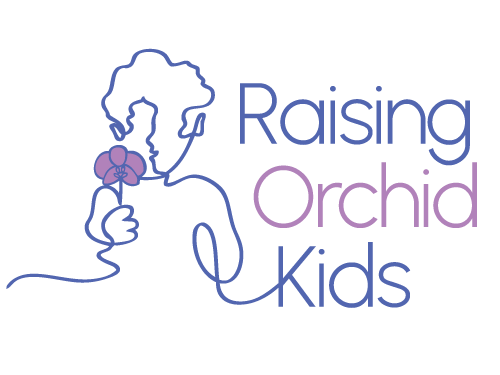Are you parenting neurodivergent kids? Overwhelmed by challenging behaviors? You’re not alone.
In a recent Raising Orchid Kids membership meeting, one parent sighed audibly and said: “It’s really hard when it’s hard.” Everyone (and we mean everyone) nodded in agreement. We laughed and half-joked that this might just become our new mantra. At the same time, we reminded each other to breathe and to spot the wins.
Raising Orchid kids is hard. But it’s also joyful, beautiful, and incredibly rewarding. And still hard.
As Glennon Doyle reminds us, we can do hard things.
The following six practical tips for raising neurodivergent kids will help you weather those stormy moments, days, or even weeks, and come out a bit steadier on the other side.
Validate yourself when parenting neurodivergent kids
At Raising Orchid Kids, we talk a lot about validating our children’s feelings as a key strategy to help them regulate and return to calm when they become dysregulated. And you know what’s just as important? Validating your own feelings.
So, if you’re parenting neurodivergent kids, you’re like feeling frustrated, exasperated, or totally overwhelmed by your child’s behavior. When you feel like you’ve hit a wall, pause and acknowledge those emotions. They’re real, they’re valid, and they deserve your compassion too.
We love to write “permission slips,” as anyone who’s taken our classes knows. So here’s yours:
•You have permission to feel ALL your feelings.
•It’s okay to wish your child wasn’t doing what they’re doing.
•To wish your Orchid were easier to parent.
•To wish you could take a break.
•It’s okay to feel like you’ve reached your limit.
Accepting these feelings doesn’t reflect a lack of love for your child; we’re all human and humans are allowed to have all the emotions. We are giving you a permission slip to accept those feelings if you have them, because our feelings are real and we can learn from them.
Name it to tame it
Sometimes, simply naming what we’re feeling can help take the edge off. This is the heart of Dr. Daniel Siegel’s “Name it to tame it” approach. Labeling our emotions, whether out loud or internally, allows us to activate the parasympathetic nervous system (our body’s calming system), helping us shift out of fight/flight/freeze mode. This process of recognizing our feelings consciously also teaches our brain to be better able to sit with challenging emotions and discomfort, rather than jumping into the doom spiral.
“Name it to tame it” is a great technique for parenting neurodivergent kids. It is a model for your Orchid (or non-Orchid) kiddo, too. Modeling how you name your big feelings in front of them teaches them how to recognize and name their own, which in turn will help them manage their own ability to tolerate discomfort.
If you’re still unsure about how this works, here’s a great video to help explain it in more detail.
Take care of your own nervous system
Staying calm and grounded in difficult parenting moments requires a strong foundation, and a strong foundation requires taking care of your own nervous system.
While we all can appreciate the brain-resetting value of long walks, yoga classes, and massages, you don’t need a huge time commitment to keep your nervous system regulated. In fact, small and consistent moments of care can be just as powerful and are often more sustainable. This is key to parenting neurodivergent children.
Try these mini-reset strategies when you feel your nervous system fraying at the edges:
-
- Take 3–5 deep breaths. Deep breathing activates the parasympathetic nervous system (which counteracts the fight/flight/freeze response).
- Try a yoga-inspired breathwork. Inhale deeply through your nose, exhale through your mouth with your jaw slacked with “box breathing” where you breathe in for a count of 4, hold at the top for a count of 4, breathe out for 4, and hold at the bottom of the breath for 4.
- Count backwards from 10, slowly and with your eyes closed if you can.
- Rub your palms together. Rubbing your palms slowly is incredibly calming for the nervous system. (Think Dr. Evil “bwahahaha” style, but lose the evil grin.)
- Step outside. Even one minute of fresh air can make a difference.
- Leave the room. A quick break in a quiet space (even the bathroom!) can help.
- Listen to music. Find a go-to “theme song” that lifts you. If you can sing along, even better! If you want to learn more, check out this Harvard study about how music can impact your nervous system.
These are just a few of many small things you can do that can help your nervous system reset when parenting neurodivergent kids.
Find communities for parenting neurodivergent kids
Raising a neurodivergent child can feel incredibly isolating. The good news is you don’t have to navigate it all alone.
Finding a community where you can share wins, worries, and wonderings in a judgment-free space is essential for keeping our own nervous systems regulated and staying grounded. When we take care of our own nervous systems, we are better able to take care of our Orchids and show up as the best parent we can be.
In that moment in our Raising Orchid Kids membership meeting when a parent shared how hard it was and everyone nodded their heads with true empathy, we all felt that sense of relief that comes when you feel real connection. Access to connection is calming for anyone parenting neurodivergent children.
Some options for connecting:
If you’ve taken our Core Course, our Raising Orchid Kids membership, created specifically for Core Course graduates, is a great way to stay connected and supported.
We also host a Facebook group, and offer support groups for parents of Orchid teens. Local communities often have SEPTAs (Special Education PTA groups), and there are many online spaces to connect.
If you need help finding a group, reach out and we’ll help you plug in.
Parenting neurodivergent kids means pain is information
When our Orchids are struggling, their behavior can be hard to manage, but this challenge is also a window into what’s happening for them beneath the surface. When we can remain calm in the face of challenging behavior, we can pay attention. Later, we can step back to reflect on what the behavior is telling us. (The strategies we mention above are a great way to get started!)
Whenever you are able to step back and reflect, you can ask yourself:
•What happened right before the meltdown or behavior occurred?
•What other factors might have played a role (hunger, tiredness, tough day at school, etc.)?
Once we’ve unpacked some of what may have been going on underneath the surface that set our Orchid’s nervous system into a tailspin, then we can start to assess how we can use that information to plan ahead for similar situations.
Shifting into reflection or “detective” mode helps us parent with more intention. We can also do this problem solving work with our Orchids, if and when they’re ready and open to that kind of conversation. Putting on our detective hat to figure out the why and problem solve for the future shifts our brains out of the doom spiral in which we lament our fate. If you could use some tips on how to shift into detective mode, check out our our blog post “Jumpstart your parenting mindest with four great tips.”
Accept the hard by noticing the good
A powerful practice for all parents, and especially those raising Orchid kids, is to consciously notice what’s going well. We promise it’s not toxic positivity; it’s actually neurobiology. When parenting neurodivergent kids, focusing on the positive helps us rewire our brain patterns and regulate our nervous system.
Start with the small wins:
•Did your child brush their teeth without a big fight?
•Did they recover from a meltdown more quickly than last week?
•Did you respond more patiently than you typically do?
Celebrate it. Name it. Share it–with yourself and with your child.
Noticing these “wins” builds momentum and helps shift us out of survival mode. Over time, noticing the good things, while making peace with the fact that parenting Orchid kids can be really hard, prompts us to meet the hard moments with more preparation and compassion.
A poem teaches us about parenting neurodivergent kids
Learn to love the messiness of life. We’ll leave you with a poem that encapsulates everything we’ve been talking about: welcoming in the full spectrum of human emotion. In his poem, Rumi reminds us that all feelings, even or especially the hard ones, has something to teach us.
The Guest House
This being human is a guest house.
Every morning a new arrival.
A joy, a depression, a meanness,
some momentary awareness comes
as an unexpected visitor.
Welcome and entertain them all!
Even if they’re a crowd of sorrows,
who violently sweep your house
empty of its furniture,
still, treat each guest honorably.
He may be clearing you out
for some new delight.
The dark thought, the shame, the malice,
meet them at the door laughing,
and invite them in.
Be grateful for whoever comes,
because each has been sent
as a guide from beyond.
Photo by Helena Lopes on Unsplash

